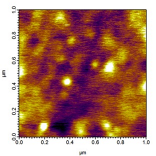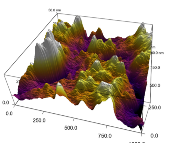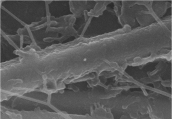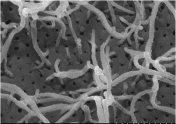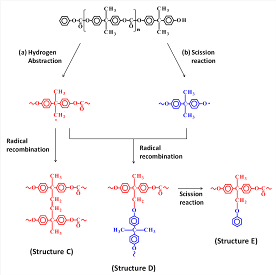|
Ultrahigh molecular weight condensation polymers (e.g., Polycarbonate, PLLA) are also investigated. We have developed a novel reaction technique that can produce very high molecular weight condensation polymerization in short reaction time. In this research, we have identified formation of partially crosslinked polycarbonates via radical induced combination reactions. |

|
Ziegler-Natta and Metallocene Catalyzed Polymerization
Ziegler-Natta catalysts and metallocene catalysts are widely used in the polyolefins industry to manufacture olefin polymers and specialty polymers. In our laboratory, we investigate the kinetics of polymerization, physical & chemical phenomena such as phase transitions during polymerization, and other important process related problems.
|
|
The polymerization process systems of interests are: solution, slurry, and gas phase polymerization of alpha-olefins and vinyl monomers. In our recent research, we study the kinetics of ethylene-cyclic olefin copolymerization and syndiospecific polymerization of styrene with various types of metallocene catalysts. Novel polymerization techniques using silica nanotube reactors (SNTRs) and one-dimensional reaction surface are also studied to develop new insights into heterogeneous catalytic polymerization kinetics.
The modeling, analysis, control and optimization of industrial polyolefin reactors are also very important areas of our research. We have collaborated with several major polyolefins manufacturing companies to develop state-of-the-art polymerization reactor models such as gas phase polymerization reactors, loop reactors, and stirred slurry reactors.
Metallocene Catalysts supported on silica of various geometries
Our latest research work is about the kinetics of olefin polymerization using support materials of various geometries including flat surface, cylindrical nanotubes, and nanoparticles. The effects of support geometry on the mass transfer and reaction phenomena are investigated experimentally and theoretically. We also investigate the heterogeneous catalytic polymerization in microreactors to design novel polyolefin microstructures. (See publications list for more information)
Experimental Facility High pressure reactor system (up to 1000 bars) Medium pressure reactor system (up to 10 bars) Low pressure glass reactor system (up to 50 psi) |
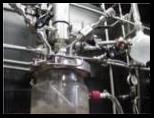
|
Polycondensation of Aromatic Polyesters/Polycarbonates/Poly(L-Lactic Acid)
Polyesters such as poly(ethylene terephthalate) (PET) and bisphenol-A polycarbonate are two of the fastest growing engineering thermoplastics. In our research, we investigate the reaction kinetics and reaction/reactor modeling problems for bulk and solid-state polymerization processes. Our laboratory is equipped with a high temperature-low pressure rotating disk melt polycondensation reactor that can be used to simulate industrial polymerization conditions. |
|
Polymerization in Nano– and Micron-Scale Spaces Our new research projects include silica nanotube reactors for catalytic polymerization of olefins and styrenics, and the heterophase polymerization in confined reaction space to synthesize polymer particles with complex internal morphologies. The SEM photo in the right illustrates one of the polymer particles synthesized in our laboratory showing small spherical particles inside a large macro-particle. These particles are expected to have a wide variety of novel applications in electronics, bio, and environmental technology. |
|
Modeling, Optimization, and Control of Polymerization Reactors
Industrial polymerization process systems pose challenging control problems due to high reaction exothermicity, nonlinear reaction kinetics, and difficulties in on-line property measurements. Our research group has been developing on-line state estimation and control techniques for free radical and transition metal catalyzed olefin polymerization reactors. When a process model is coordinated with stochastic state/parameter estimators such as extended Kalman filter, the estimation of unmeasured state variables and polymer properties (e.g., MW and MWD) becomes possible. In particular, we have developed a novel MWD control technique for free radical polymerization of vinyl monomers and tested its feasibility through laboratory experimentation (Please see Publications/Free radical polymerization page)
Experimental Facility 4L Computer interfaced stainless steel stirred tank reactor (decommissioned) Gel permeation chromatograph |





|
Poly(methyl methacrylate) microparticle with nanoscale sub particles |
|
Laboratory Members |
